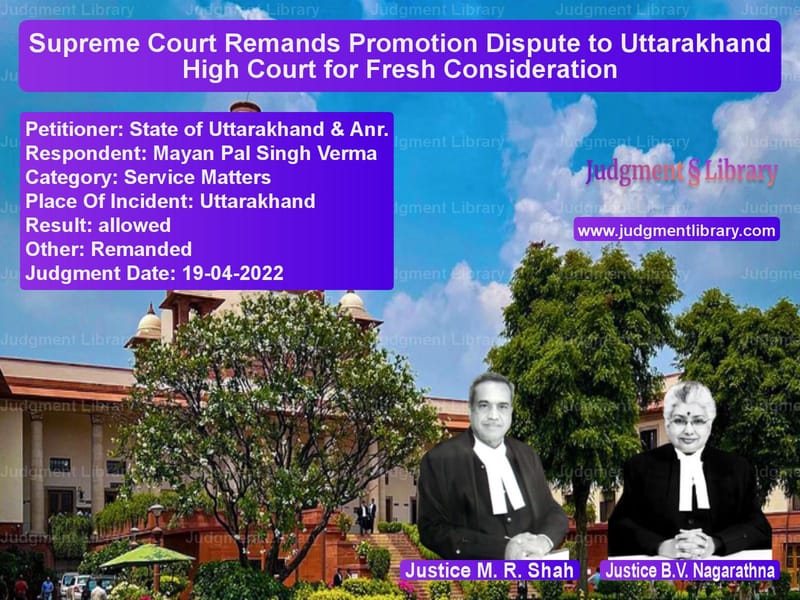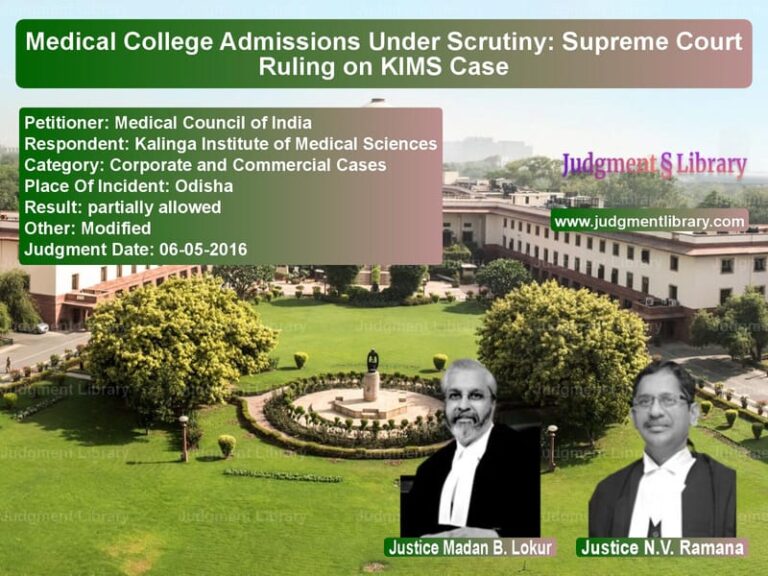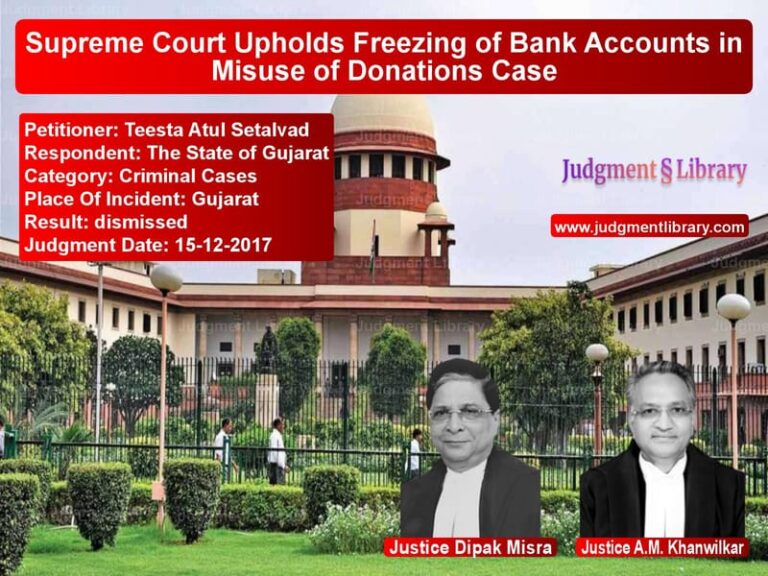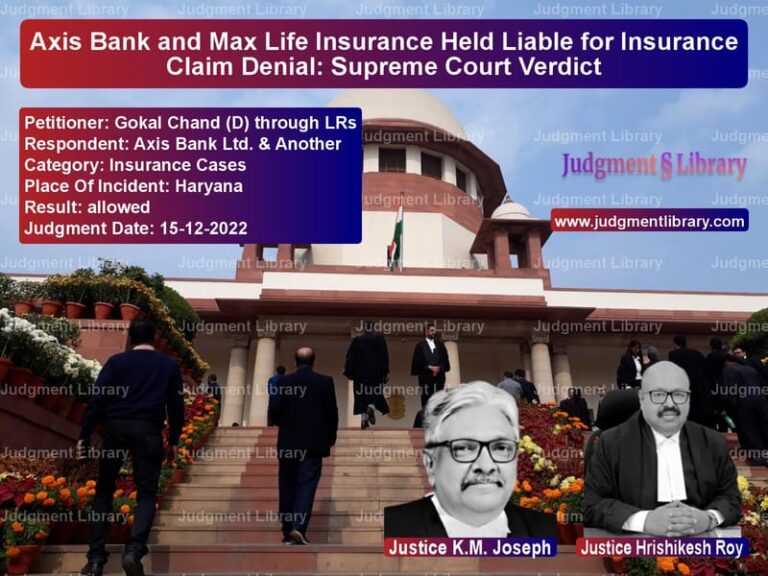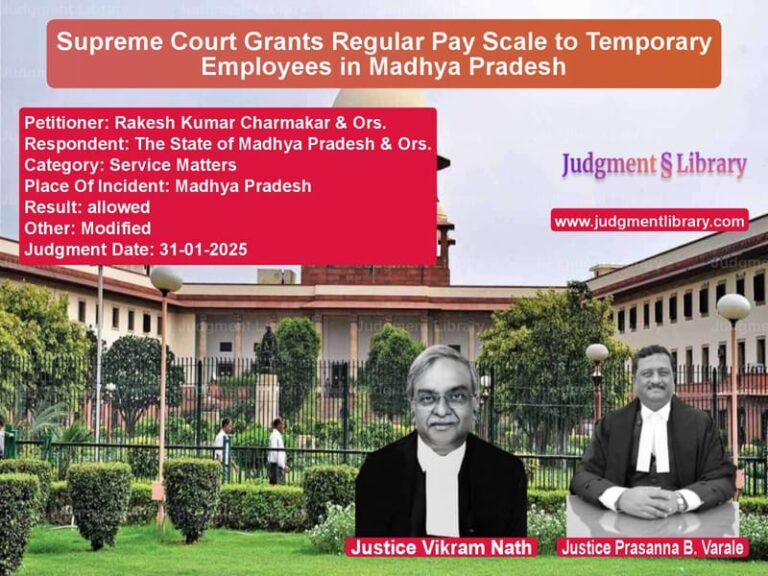Supreme Court Remands Promotion Dispute to Uttarakhand High Court for Fresh Consideration
The Supreme Court of India recently ruled in State of Uttarakhand & Anr. vs. Mayan Pal Singh Verma, addressing the issue of promotion and Annual Confidential Report (ACR) evaluation in public service employment. The case arose from a challenge to an order of the Uttarakhand Public Service Tribunal regarding the eligibility criteria for promotions.
Background of the Case
The respondent, Mayan Pal Singh Verma, was an engineer in the Public Works Department (PWD) of Uttarakhand. He sought a promotion to the post of Chief Engineer Level-2. However, his promotion was denied due to his ACR ratings, which included uncommunicated ‘Uttam’ entries. Feeling aggrieved, he challenged the decision before the Uttarakhand Public Service Tribunal, which ruled in his favor.
The State of Uttarakhand then challenged this order before the Uttarakhand High Court. However, the High Court disposed of the matter without examining the merits of the government’s appeal and simply directed the state to comply with the Tribunal’s order. Dissatisfied with this decision, the State of Uttarakhand appealed to the Supreme Court.
Legal Issues
- Whether uncommunicated ACR entries could be ignored in promotion decisions.
- Whether the High Court erred in disposing of the writ petition without deciding on the merits of the Tribunal’s order.
- The duty of courts to provide reasoned judgments in public service disputes.
Arguments by the Parties
State of Uttarakhand’s Arguments
- The government argued that the Tribunal’s order was legally flawed and should have been examined on merits by the High Court.
- It contended that ACR entries, even if uncommunicated, were part of the service records and could be relied upon in promotion decisions.
- The state also emphasized that the High Court failed to examine the grounds of appeal before directing compliance with the Tribunal’s ruling.
Respondent’s Arguments
- The respondent maintained that uncommunicated ACR entries should not be used against employees in promotion decisions.
- He asserted that the Tribunal had correctly ruled in his favor and that the government was unnecessarily delaying his promotion.
- The respondent further argued that the High Court’s order ensured justice by upholding the Tribunal’s ruling.
Supreme Court’s Judgment
Key Observations
- The Supreme Court noted that the High Court disposed of the matter in a cursory manner without addressing the legality of the Tribunal’s order.
- The Court held that the High Court was required to independently examine the merits of the case instead of issuing a blanket compliance order.
- It cited previous judgments emphasizing that courts must provide reasoned orders when dealing with administrative service disputes.
Final Decision
The Supreme Court set aside the High Court’s order and remanded the case for fresh consideration. It directed the High Court to:
- Re-examine the legality and correctness of the Tribunal’s order.
- Provide a reasoned judgment addressing the arguments of both parties.
- Ensure that the case is decided in accordance with established legal principles.
“The High Court was required to apply its independent mind to the issues raised and decide the writ petition on merits. Its failure to do so compels us to remand the matter for fresh consideration.”
Implications of the Judgment
For Public Service Employees
- The ruling clarifies the importance of fair ACR evaluations in promotion decisions.
- It reinforces that uncommunicated ACR entries should not be used arbitrarily against employees.
For Administrative Tribunals and High Courts
- The decision emphasizes the duty of reasoned decision-making in service matters.
- It underscores the necessity for High Courts to examine Tribunal orders on merits before issuing directives.
For Government Departments
- The ruling provides guidance on the proper use of ACR records in promotions.
- It ensures that government policies align with principles of transparency and fairness.
Conclusion
The Supreme Court’s decision in State of Uttarakhand & Anr. vs. Mayan Pal Singh Verma underscores the need for reasoned judgments in public service disputes. By remanding the case for fresh consideration, the Court reaffirmed the principle that judicial orders must be based on a proper examination of facts and law. This ruling sets a crucial precedent for future cases involving administrative promotions and ACR evaluations.
Petitioner Name: State of Uttarakhand & Anr..Respondent Name: Mayan Pal Singh Verma.Judgment By: Justice M. R. Shah, Justice B.V. Nagarathna.Place Of Incident: Uttarakhand.Judgment Date: 19-04-2022.
Don’t miss out on the full details! Download the complete judgment in PDF format below and gain valuable insights instantly!
Download Judgment: state-of-uttarakhand-vs-mayan-pal-singh-verm-supreme-court-of-india-judgment-dated-19-04-2022.pdf
Directly Download Judgment: Directly download this Judgment
See all petitions in Employment Disputes
See all petitions in Promotion Cases
See all petitions in Public Sector Employees
See all petitions in Judgment by Mukeshkumar Rasikbhai Shah
See all petitions in Judgment by B.V. Nagarathna
See all petitions in allowed
See all petitions in Remanded
See all petitions in supreme court of India judgments April 2022
See all petitions in 2022 judgments
See all posts in Service Matters Category
See all allowed petitions in Service Matters Category
See all Dismissed petitions in Service Matters Category
See all partially allowed petitions in Service Matters Category

